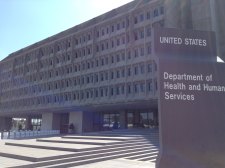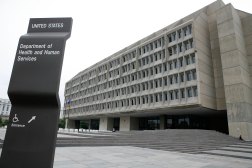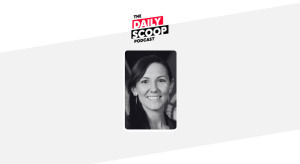How HHS is spurring data innovation both inside and outside the agency

It will be obvious when the Department of Health and Human Services’ IDEA Lab is a success, because it will no longer be needed, according to Damon Davis, the director of the department’s Health Data Initiative.
Davis spoke about the lab as a way the department is driving innovation through data, which in turn can change the internal culture around innovation and help spur health-focused products and services outside the agency.
His remarks Wednesday at MarkLogic’s Data Innovation Summit, produced by FedScoop, hit on numerous HHS efforts, including various challenges, data initiatives and data-driven events.
The efforts are something HHS ran with after President Barack Obama made open data a key focus of his administration. Davis said that focus gave HHS the ability to drive culture change within the agency.
“We’re not implementing any new statues but emphasizing new strategies allowed under approved legislation,” Davis said. “Establishing an innovative culture also requires to a degree a data-driven culture.”
That drive for change has helped HHS remove what Davis called “calcified government processes,” leading to the creation of data tools and challenges that helped HHS further its missions.
Since 2011, HHS has held 130 challenges with 800 participants, issuing $6 million in awards with a median price of $50,000. Davis also expects HHS to award three times as much prize money in 2016 that it did in 2015.
The agency just handed out a number of awards at its recent Health Datapalooza, a national conference focused on liberating health data. The department issued $25,000 to the National Opinion Research Center (NORC) at the University of Chicago in its Rheumatoid Arthritis Data Challenge, as well as $80,000 to six teams that built projects dedicated to services like real-time air quality maps and open volumes of brain imaging data.
Davis also spoke about his agency’s homegrown data projects, including a Mapping Medicare Disparities Tool to identify areas of disparities between subgroups of Medicare beneficiaries (e.g., racial and ethnic groups) in health outcomes, utilization and spending.
Davis used the tool as an example of how agencies need to move past cataloging data on data.gov for people to figure out their own use cases.
“We need to be moving from dumping data sets onto data.gov to one where be can be more conversant with the public about what is valuable to them and deliver those data as assets,” Davis said. “To accomplish the goal of well managed data, we have to invest in personnel and infrastructure to support more demand and capacity to participate in the growing data innovation ecosystem.”
Contact the reporter on this story via email at greg.otto@fedscoop.com, or follow him on Twitter at @gregotto. His OTR and PGP info can be found here. Subscribe to the Daily Scoop for stories like this in your inbox every morning by signing up here: fdscp.com/sign-me-on.






